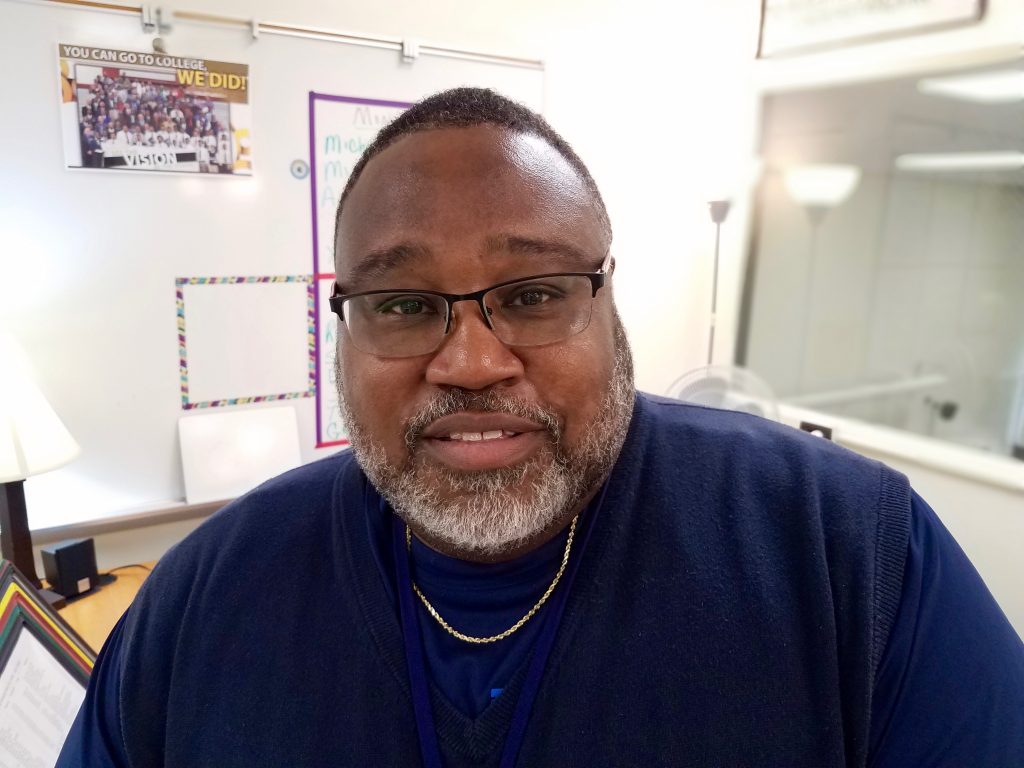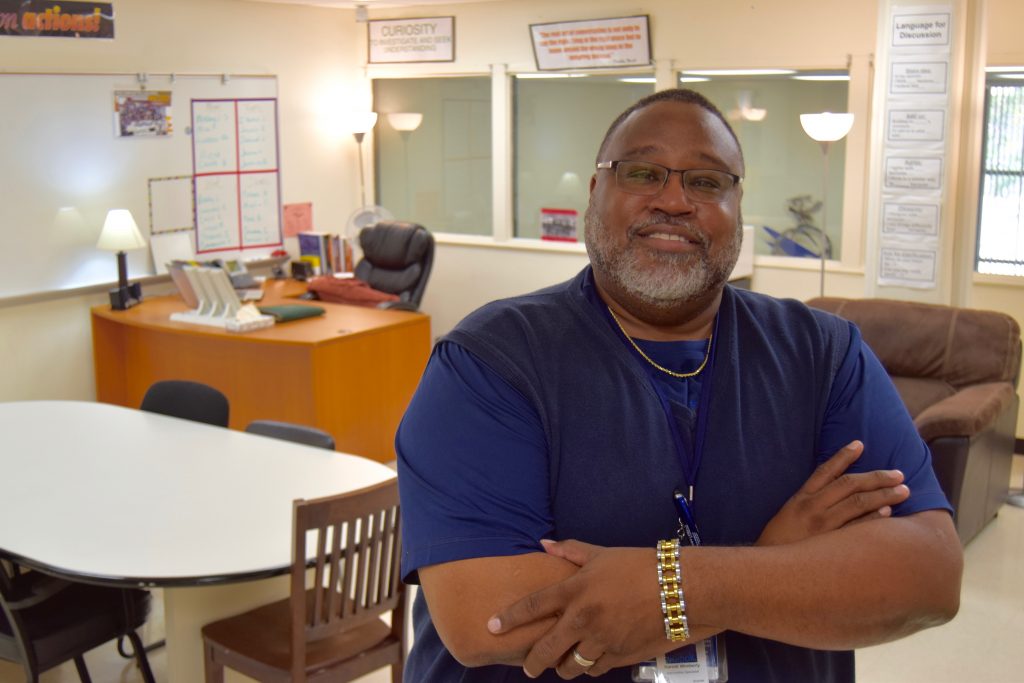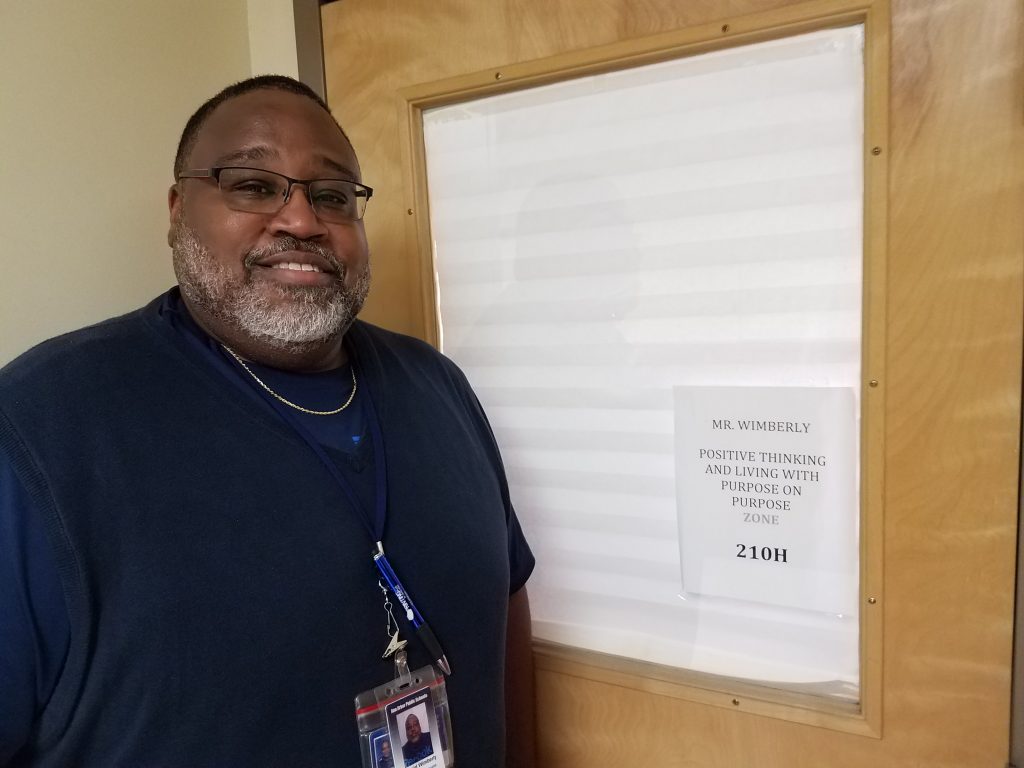

Photos and video by Jo Mathis/AAPS District News Editor
For the last 29 years, Harold Wimberly has been serving struggling Washtenaw County youth and families in various capacities, particularly in behavioral counseling, life-skills training and program development for youth. He has been an AAPS intervention specialist for the last five years.
Wimberly earned a bachelor’s degree in criminal justice from Eastern Michigan University in 1989. Since then, he has been named Youth Counselor of the Year in Washtenaw County; Bob Rader’s National Counselor of the Year; and the S.L Roberson Community Leadership Award in Washtenaw County for outstanding community engagement.
Wimberly, who has served in administrative capacities the last 16 years of his career, has worked with several agencies, including Washtenaw County Juvenile Detention, Boysville of Michigan, Wedgwood Christian Services, City of Ypsilanti Parks and Recreation, and Vista Maria Girls Treatment Facility.
In 1996, he was a guest lecturer at the University Of Michigan School Of Social Work, speaking on the topic of what makes a successful childcare worker. He has also served as program director of the Children’s Protective Services Family Advocacy Program through POWER, INC.
Wimberly, a native of Cleveland Ohio (where his parents still live) is the founder of New Heights Education and Training Program LLC, which is a life skills program for struggling male teens. He also served two years as vice president of the Willow Run Community Schools Board of Education.
Wimberly attends Christian Love Fellowship Ministries International church in Ypsilanti, where he and his wife of 26 years, Angela, serve as the youth and young adult pastors. They have three daughters and four grandchildren. Wimberly enjoys golf, reading, and coaching basketball.
What is your career path, and how long have you been in your current job? My career path has always been working with youth and families that society typically overlooks or that have limited to no resources. Eventually, I want to develop a center that focuses on helping to revive and restore a hope for youth and families in struggling communities. I have been an intervention specialist for AAPS for the last five years and I love every moment of what I do.
What inspired you to become an intervention specialist? Becoming an intervention specialist just truly seemed in line with what I have been doing for so many years and it was an opportunity to slow down and or stop that path for students who could possibly travel down the wrong road in life. Working in a district such as AAPS was another plus for me as well.
What was your Plan B? Having a Plan B has never entered into my mind because my father always taught me that pursuing your dreams is important and worth enduring the pain of reaching that desired goal. Having a Plan B just gives me a potential excuse for not accomplishing my Plan A.
You say you don’t like calling students “at risk,” though so many do. Why is that? I struggle with labeling students “at-risk” because truthfully we are all at-risk of something. So I rather identify all students as “at-promise” because what that says to the student is that you have promise for a great future, and even in the midst of hard times you are at-promise for greatness. The other reason is that some kids are labeled “at-risk” just because of their economic status or even the color of their skin. I also find that how we look at students and how we label students gives permission for others to continue to identify them in that manner as well, instead of seeing them for the potential that they in fact have.
What do most people not know about AAPS intervention specialists? I think that most people feel that our role as intervention specialist is somehow a position that polices student’s behavior, or that we are the disciplinarians in the schools. That is so far from the truth. When we first started in the 2013-2014 school year, we had four schools (three high schools and one middle school) that totaled 80 students, 42 suspensions, and a combined cumulative GPA of 1.2. In less than a year, the four of us intervention specialists were able to connect with those students, families, and teachers in such a way that the 42 suspensions were reduced to 18 total and the GPA improved to a 1.95 with a number of our students reaching a 3.0 or better. That’s “at-promise” at its finest!
We spend lots of time with our students and families—even during weekends and holidays every year. And it has made a difference in not only our caseloads, but the AAPS district overall.

How important are families when you are working with students? Families are the key to every student’s success. Without that connection with parents during the students’ tenure in school, connecting the dots becomes a daunting task. If parents themselves are struggling the life of the student takes on that struggle as well and it puts barriers in the way of success for that student. Every parent that I have been able to connect with in my five years as an intervention specialist for AAPS has in so many ways guaranteed that students succeed. Students seeing their parents modeling real relationships with teachers and administration is key.
Describe an average workday.
- Small group discussion with my caseload
- Individual focus meetings with my students who are scheduled for that day
- Parent phone calls as needed just reach out and connect with them
- Connecting with teachers, counselors, and administration
- Lunch with some of my students in the lunchroom
- Problem-solving with students and their peers or teachers
- Researching potential resources for students and families as needed
- Every day I am looking for ways to improve my relationship with students, parents, and teachers
What’s the highlight of your day? When I am able to see the students daily and support them through some challenging areas I am just super excited because the look in their eyes when they taste success is priceless.

What’s the most important thing you’ve learned about teaching? About learning? That I am walking in either one of these shoes daily and it doesn’t always come from those that carry a title.
Which apps and websites would you recommend to other teachers? The biggest area I feel school professionals should familiarize ourselves with is social media sites because those sites are the lifeline for the majority of today’s students. I think movie and music sites are also key to learn because students live by these sites and if something is going to stir up drama in a school on a particular day, it’s going to be Snapchat or Instagram. My other reason is that we should always keep up with what is occupying our student’s minds.
How do you stay organized? Writing out my schedule on my phone, but I’ve learned that in middle school what you plan can change in a blink of the eye. I start by looking who I need to meet with daily then I make my necessary phone calls to parents whom I need to follow up with.
What was always written on your report card in middle school? I was one of those kids in junior high that did the minimal work needed to get finished. My grades were average, but I knew I could have done so much more.
How have you seen education change? Education, when I was younger, didn’t have all this technology at your fingertips. Students today have so many things that could easily distract them and get in the way of education. I am also starting to notice that more kids have challenges in school and out of school for various reasons that become disruptions to the student.
If you could change one thing about public education, what would it be? Teach the student and not so much the text.
You have a spacious, comfortable office with all sorts of seating options. Is there a reason behind that? I have 24 students on my caseload that come in and meet with me weekly and I want to make my space look and feel non-traditional. I want my students to feel comfortable when they come in and visit me regardless of the reason.

Congratulations to you my long time friend. Keep teaching our young men and women to be the best they can regardless of their environment. Glad to see you’re making a difference to so many.